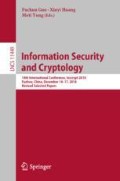Abstract
Monero is one of the most valuable cryptocurrencies in the market, focusing on users’ privacy. The built-in features in Monero help users to obfuscate the information of the senders and the receivers, hence achieve a better privacy compared to other cryptocurrencies such as Bitcoin. Previous studies discovered multiple problems within Monero systems, and based on these findings, Monero system has been improved.
Although improvements have been made, we discovered that new attacks targeting the anonymity reduction can still be conducted in Monero system. In this paper we propose two attacks. The first is an extension of a known attack called Monero Ring Attack. The second one exploits Payment ID to discover the real output of a mixin. We then propose countermeasures to these attacks.
Access this chapter
Tax calculation will be finalised at checkout
Purchases are for personal use only
Notes
- 1.
Based on information provided by Coinmarketcap.com on 22 March 2018.
- 2.
- 3.
The information is taken from Coinmarketcap.com on 4 April 2018. The value of trading volume is calculated by summarizing all trading pair volumes.
- 4.
The information is taken from the platforms on 4 April 2018.
References
Nakamoto, S.: Bitcoin: A Peer-To-Peer Electronic Cash System (2008)
van Saberhagen, N.: Cryptonote v 2.0 (2013)
Meiklejohn, S., et al.: A Fistful of Bitcoins: Characterizing Payments Among Men with No Names. USENIX; login (2013)
Reid, F., Harrigan, M.: An analysis of anonymity in the bitcoin system. In: Altshuler, Y., Elovici, Y., Cremers, A., Aharony, N., Pentland, A. (eds.) Security and Privacy in Social Networks. Springer, New York (2013). https://doi.org/10.1007/978-1-4614-4139-7_10
Ron, D., Shamir, A.: Quantitative analysis of the full bitcoin transaction graph. In: Sadeghi, A.-R. (ed.) FC 2013. LNCS, vol. 7859, pp. 6–24. Springer, Heidelberg (2013). https://doi.org/10.1007/978-3-642-39884-1_2
Wijaya, D.A., Liu, J., Steinfeld, R., Liu, D.: Monero Ring Attack: Recreating Zero Mixin Transaction Effect. Cryptology ePrint Archive (2018)
Kumar, A., Fischer, C., Tople, S., Saxena, P.: A traceability analysis of monero’s blockchain. In: IACR Cryptology ePrint Archive 2017, p. 338 (2017)
Miller, A., Möser, M., Lee, K., Narayanan, A.: An Empirical Analysis of Linkability in the Monero Blockchain. arXiv preprint arXiv:1704.04299 (2017)
Noether, S., Noether, S., Mackenzie, A.: MRL-0001: A note on chain reactions in traceability in cryptonote 2.0. Technical report (2014)
Fujisaki, E., Suzuki, K.: Traceable ring signature. In: Okamoto, T., Wang, X. (eds.) PKC 2007. LNCS, vol. 4450, pp. 181–200. Springer, Heidelberg (2007). https://doi.org/10.1007/978-3-540-71677-8_13
Liu, J.K., Wei, V.K., Wong, D.S.: Linkable spontaneous anonymous group signature for ad hoc groups. In: Wang, H., Pieprzyk, J., Varadharajan, V. (eds.) ACISP 2004. LNCS, vol. 3108, pp. 325–335. Springer, Heidelberg (2004). https://doi.org/10.1007/978-3-540-27800-9_28
Noether, S., Mackenzie, A.: Ring confidential transactions. Ledger 1, 1–18 (2016)
Maxwell, G.: Confidential Transactions (2015)
Getmonero. https://getmonero.org/resources/moneropedia/ringCT.html
Bitcoin BIP. https://github.com/bitcoin/bips/blob/master/bip-0032.mediawiki
Noether, S., Goodell, B.: An Efficient Implementation of Monero Subaddresses (2017)
Getmonero. https://getmonero.org/resources/moneropedia/paymentid.html
Getmonero. https://getmonero.org/resources/moneropedia/fungibility.html
Glaser, F., Zimmermann, K., Haferkorn, M., Weber, M.C., Siering, M.: Bitcoin - asset or currency? Revealing users’ hidden intentions. In: Twenty Second European Conference on Information Systems (2014)
Author information
Authors and Affiliations
Corresponding author
Editor information
Editors and Affiliations
Rights and permissions
Copyright information
© 2019 Springer Nature Switzerland AG
About this paper
Cite this paper
Wijaya, D.A., Liu, J., Steinfeld, R., Liu, D., Yuen, T.H. (2019). Anonymity Reduction Attacks to Monero. In: Guo, F., Huang, X., Yung, M. (eds) Information Security and Cryptology. Inscrypt 2018. Lecture Notes in Computer Science(), vol 11449. Springer, Cham. https://doi.org/10.1007/978-3-030-14234-6_5
Download citation
DOI: https://doi.org/10.1007/978-3-030-14234-6_5
Published:
Publisher Name: Springer, Cham
Print ISBN: 978-3-030-14233-9
Online ISBN: 978-3-030-14234-6
eBook Packages: Computer ScienceComputer Science (R0)

